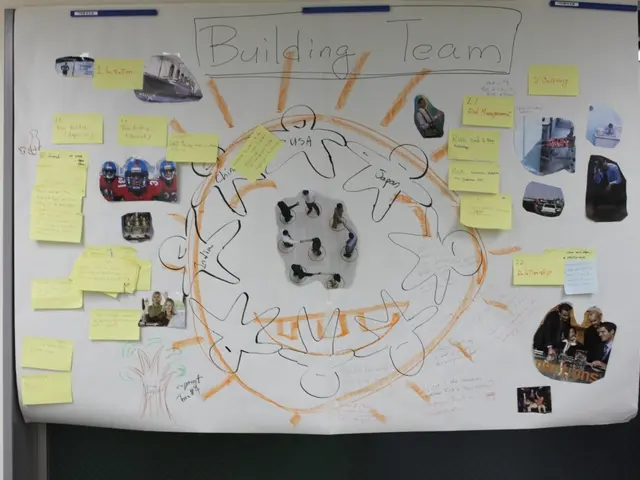Impactful Parental Demonstrations Shaping Emotional Regulation in Children, Set to Alter Their Lives Dramatically
Parenting is more than feeding and clothing your little ones – it's about teaching them how to navigate the world, including handling their emotions. And guess who's the best teacher for that? You! That's right, parents play a crucial role in shaping their kiddo's emotional health, thanks to a phenomenon called parental modeling.
Kids are like sponges, absorbing every move and word you make. So, if you're dealing with a tough situation and keeping your cool, your child is watching and learning. Conversely, if you often lose it or use unhealthy ways to cope, they might pick up those bad habits too. Now's the time to brush up on some stellar emotional management skills – your child's emotional future is counting on you!
In this new and improved world, teaching your child how to manage their feelings is more vital than ever. Why? Kids frequently look up to their parents as role models. By knowing how to model your emotions, you can step up as a superhero in your child's emotional growth journey, taking on three big roles:
- Emotional Guide – Parental modeling shines through in what you say, do, and how you handle your feelings. As you model healthy ways to deal with emotions like calmness or enthusiasm, your child learns how to handle their feelings more effectively.
- Emotional Coach – Helping your child understand and share their feelings builds a strong emotional bond between the two of you. And who knows, you might even pick up a few tips from them!
- Emotional Mirror – Just like when your child learns to talk by imitating the sounds they hear, they'll also learn to manage their emotions by observing yours. So, remember, your emotions – they're not just yours, they're theirs too!
The Impact of Parental Modeling: Emotional Regulation and Beyond
Emotion Regulation 101
Emotional regulation is the key to emotional intelligence, and it's all about handling your feelings in a healthy, productive way. Mastering emotional regulation is essential for your child's overall growth, making friends, and feeling good about themselves.
The ABCs of Emotion Regulation
Emotional regulation falls into three main categories:
- Understanding Emotions – Recognizing and labeling your emotions is vital. When you help your child do the same, they learn to understand their own emotions too.
- Managing Emotions – Techniques for calming down, such as taking deep breaths or finding a positive thought, can help your child deal with strong emotions.
- Expressing Emotions – Healthy ways to express emotions, like talking things over or writing about your feelings in a journal, teach your child how to communicate effectively.
The Parent-Child Connection: Strong Bonds, Emotional Resilience, and Beyond
It all boils down to the quality of the relationship between parents and their children. Kids who feel supported and loved show improved emotional regulation skills. In contrast, kids without emotional support struggle to deal with feelings and may develop negative coping strategies.
Programs such as Attachment and Biobehavioral Catch-up (ABC) and Circle of Security help strengthen the bond between parents and children, leading to better emotional outcomes. Additionally, programs that teach parents to understand their children's feelings, such as Minding the Baby, foster healthier relationships with their kids.
The Tripartite Model: Family Influence on Emotion Regulation
Learning to manage emotions occurs within the family setting. Research suggests that kids learn to manage their emotions through three channels: observational learning, parenting practices, and family mood.
Observational Learning and Modeling
Children are keen observers, taking cues from their parents' emotional behaviors. By watching their parents manage their feelings, kids learn useful skills for handling their own emotions.
Emotion-Related Parenting Practices
Parents help their children understand and express their feelings. Active listening, sharing your own feelings, and providing emotional support create a nurturing environment that helps kids manage their emotions more effectively.
Emotional Climate of the Family
A family's overall mood impacts kids' emotional intelligence. A loving, open atmosphere positively affects kids' ability to manage their feelings, while negative, inconsistent environments can make it harder for them to do so.
The Role of Parental Modeling in Emotion Regulation
Parents are their kids' first and primary emotional guides. Research shows that parental modeling plays a significant role in teaching kids how to manage emotions.
Kids Learn by Watching
If you show healthy ways to manage emotions, your child is more likely to follow suit. The opposite is also true – if you display negative coping strategies, your child might adopt those bad habits.
Model the Good Stuff
Being a good emotional role model sets your child up for success in various aspects of their life, such as academic success, better relationships, and improved mental health. So remember, stay cool, calm, and collected!
By focusing on a strong parent-child bond, you're playing a tremendous role in fostering your child's emotional skills and emotional resilience. When you model emotional management, you're giving your child a valuable life-long skill that enables them to cope with life's challenges more effectively.
The Impact of Parenting Styles on Emotion Regulation
Parenting styles affect the emotional development of children. Research consistently shows that an authoritative parenting style – one that is warm, supportive, and sets clear boundaries – helps kids feel emotionally secure and proactive in managing their emotions. In contrast, harsh and controlling parenting leads to emotional struggles – setting the stage for problems down the line.
The Power of Authoritative Parenting
Authoritative parents strike a balance between being understanding and caring while setting clear boundaries. This creates a nurturing environment where children feel encouraged to explore their emotions and develop emotional regulation skills.
The Perils of Harsh and Controlling Parenting
Children who grow up with ineffective parenting may miss out on vital emotional development opportunities and struggle to manage their feelings effectively.
Parent-Child Relationship Quality and Emotion Regulation
Children who feel loved, supported, and emotionally secure tend to handle their feelings more effectively. And guess who plays a huge role in making that happen? You! Parents who listen to their children's feelings, provide emotional support, and create a calm and positive environment help their children navigate their emotions more effectively.
Emotional Support and Warmth
A supportive parent-child relationship not only helps kids manage their feelings better, but it also promotes open communication, builds trust, and strengthens the bond between parent and child.
Dealing with Emotional Challenges
Parents who help their children cope with emotional challenges and find positive ways to manage their feelings help their children develop healthy emotional regulation skills and build their emotional resilience.
Programs like Attachment and Biobehavioral Catch-up (ABC) and Circle of Security help parents build strong bonds with their children, leading to better emotional outcomes for their offspring.
Managing Your Emotions for Your Child's Sake
Remember, your emotions matter. Your emotional well-being impacts your child's emotional growth, illustrating how powerful parental modeling is. By learning to manage your emotions effectively and serving as a positive emotional role model for your child, you support your child's emotional development during a crucial time in their life.
Parental Emotionality: Shaping Your Child's Emotional Future
Long-term studies have shown that A) mothers who treat their babies with kindness and empathy produce children with fewer negative emotions, and B) babies who have fathers who are responsive and nurturing grow up to have better emotional health.
The ABCs of Emotional Management
- Be Aware of Your Emotions – Understanding your emotions helps you learn how to manage them effectively. Developing self-awareness and mindfulness can aid in your quest for better emotional management.
- Breathing Exercises – Focusing on your breathing can help you stay calm and centered, even when facing a challenging situation.
- Mindfulness and Meditation – Practicing mindfulness and meditation can help you become more aware of your feelings, develop emotional stability, and improve your overall emotional well-being.
- Express Your Emotions – Finding healthy ways to express your emotions, such as writing, talking, or drawing, can help release negative emotions and promote emotional regulation.
- Take Care of Yourself – Prioritize self-care, whether through exercise, hobbies, or spending time with loved ones. When you take care of yourself, you cultivate emotional resilience and set an excellent example for your child.
By combining healthy eating, staying active, managing stress, seeking support when needed, and prioritizing self-care, you create a solid foundation for emotional well-being – one that supports your ability to be a positive emotional role model for your child.
In conclusion, parents play a significant role in their child's emotional development, setting the stage for healthy emotional regulation, resilience, and well-being. By modeling healthy emotional management, parents provide their children with essential skills to help them navigate life's ups and downs. In the end, your influence as a positive emotional role model leaves a lasting gift to your child – the tools they need to thrive as emotionally intelligent and resilient individuals.
Sources:
- The Role of the Family Context in the Development of Emotion Regulation
- Importance of Teaching Children Emotional Regulation –
- Emotion Regulation in Parenthood – PMC
- Parental Emotion Regulation Strategies and Parenting Quality Predict Child Internalizing Symptoms in Families Experiencing Homelessness
- Parental Emotionality: The Role of Parents' Own Childhood Maltreatment (Chapter 4) – Emotion Regulation and Parenting
- Frontiers | The impact of parenting styles on undergraduate students' emotion regulation: The mediating role of academic-social student-faculty interaction
- Parenting and Child Development: A Relational Health Perspective
- Associations Between Emotion Regulation and Parental Reflective Functioning
- How to help kids understand and manage their emotions
- Frontiers | Parenting style and children emotion management skills among Chinese children aged 3-6: the chain mediation effect of self-control and peer interactions
- Negative Parenting, Adolescents' Emotion Regulation, Self-Efficacy in Emotion Regulation, and Psychological Adjustment
- Parental Emotion Regulation: Impact on Toddler Emotion Regulation and Stranger-Oriented Behavior
- Parental Emotion Regulation and Externalizing Problems in Children’s Life Course
- Parental Warmth, Adolescent Emotion Regulation, and Adolescents' Mental Health During the COVID-19 Pandemic
- The Child and Parent Emotion Study: Protocol for a Longitudinal Study of Parent Emotion Socialization and Child Socioemotional Development
- A Parent's Affect on Their Child's Mental Health
- Associations between social behaviors and experiences with neural correlates of implicit emotion regulation in middle childhood
- Neural correlates of automatic emotion regulation and their association with suicidal ideation in adolescents during the first 90-days of residential care – Translational Psychiatry
- Parenting Intervention for Psychological Flexibility and Emotion Regulation: Clinical Protocol and an Evidence-Based Case Study
- Effects of emotionally oriented parental interventions: a systematic review and meta-analysis
- Findings, Issues, and New Directions for Research on Emotion Socialization
- Current Themes in Understanding Children's Emotion Regulation as Developing from within the Parent-Child Relationship
- Frontiers | Parental Emotion Socialization and Child Psychological Adjustment among Chinese Urban Families: Mediation through Child Emotion Regulation and Moderation through Dyadic Collaboration
- Emotional Regulation in Children: A Parent's Guide to Helping
- The Role of the Parent-Child Relationship in Emotion Regulation: A Developmental Perspective
- Parental Emotion Strategies and Children’s Emotion Regulation
- Emotion Regulation Development in Adolescence and Early Adulthood from a Parent-Child Relationship Perspective
- Neural Correlates of Parental Emotion Regulation and Their Association with Child Emotion Regulation
- The Development of Emotion Regulation from Within the Parent-Child Relationship
- A Meta-Analytic Examination of Parent-Dependent and Parent-Independent Variables in Children's Emotion Regulation: In a Time of Changing Family Structures and Gender Roles
- The Impact of Emotion Socialization on Children's Emotional Well-Being: A Review of the Literature
- The Role of Parenting in Children's Emotion Regulation: Current Knowledge and Implications for Family Practitioners
- Emotion Regulation Training Programs: An Overview for Parents
- Parental Emotion Socialization and Child Emotion Regulation in Middle Childhood: A Multilevel Path Model
- Parent-Child Emotion Co-Regulation and Children's Emotion Regulation Competence
- Parent-Child Emotion Co-Regulation: Contemporary Challenges and New Directions in Research
- Emotion Regulation and Parent-Child Interaction: An Overview of Current Research and Intervention Approaches
- Parenting Style and Infant Emotion Socialization: A Meta-Analytic Examination
- Infant Emotion Socialization: A Meta-Analytic Examination of Associations with Mothers' and Fathers' Parenting, and Demographics
- Emotion Regulation in Father-Child Interaction: A Meta-Analytic Examination of Child and Father Characteristics
From Touchy to Emotionally Intelligent:As your child grows, pay attention to their emotional intelligence and focus on improving it. Here are some extra tips to help you along the way:
- Encourage your child to name their emotions. Use simple words like “happy,” “sad,” “mad,” and “scared.”
- Practice active listening. Show your child that you're paying attention by asking questions about their feelings, validating their emotions, and reflecting on what they're saying.
- Model healthy emotional management in your interactions with your child, such as taking a moment to calm down before reacting to their behavior.
- Improve family communication by creating a safe, open, and supportive environment for discussions about feelings.
- Encourage your child to solve problems and make decisions based on their emotional states.
- Practice empathy by teaching your child to take another person's perspective and respond accordingly.
- Foster flexibility by helping your child come up with adaptive solutions when they face problems that elicit strong emotions.
- Develop resilience by encouraging your child to tackle challenges head-on, remembering that failure is not a sign of weakness but an opportunity for growth.
- Introduce mindfulness practices, such as meditation, practicing gratitude, or journaling, to help your child connect with their emotions and develop emotional regulation strategies.
- Find resources, such as books, videos, or online parenting advice, to help further develop your own emotional intelligence and ability to model healthy emotional management for your child.
By focusing on these strategies, you'll help your child develop their emotional intelligence and transform touchy exchanges into productive, meaningful interactions.
- Parents play a crucial role in shaping their child's emotional health due to a phenomenon called parental modeling, where kids absorb every move and word parents make.
- Being a good emotional role model sets your child up for success in various aspects of their life, such as academic success, better relationships, and improved mental health.
- The quality of the parent-child relationship has a significant impact on children's emotional regulation skills, with kids who feel supported and loved showing improved emotional regulation.
- The power of authoritative parenting lies in its ability to create a nurturing environment where children feel encouraged to explore their emotions and develop emotional regulation skills.
- By combining emotional intelligence, healthy parenting practices, and setting boundaries, parents can help their children develop strong emotional resilience and navigate life's challenges more effectively.







